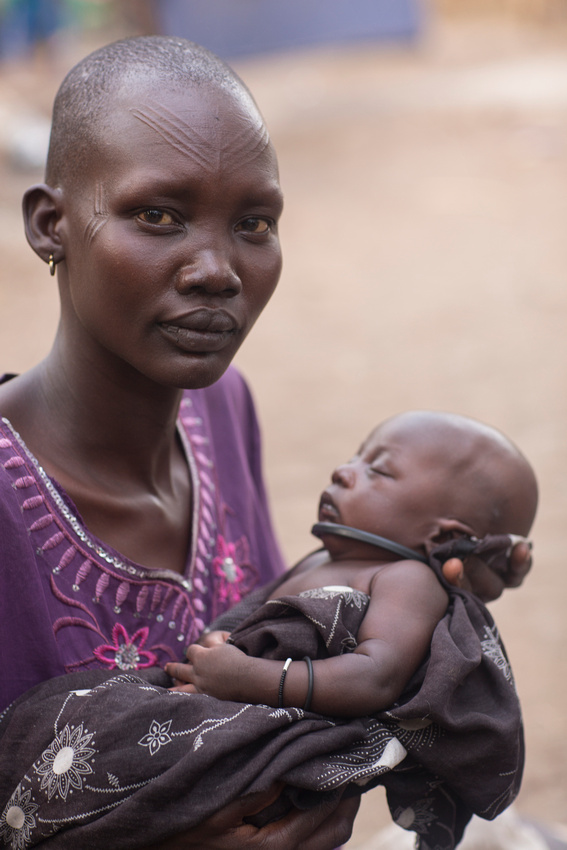South Sudan marks the fourth anniversary of its independence on 9th July 2015. While the country faced enormous development challenges after separating from Sudan, it was a time of great hope. Today, however, the world’s newest nation is facing a humanitarian catastrophe.
The civil war that broke out in December 2013 has killed tens of thousands of people, driven 1.5 million from their homes, and left millions more in urgent need of life-saving aid. Fighting has intensified over the last few months, especially in Unity, Upper Nile and Jonglei states, cutting off many areas from humanitarian relief.
Until the recent upsurge in violence, CAFOD and Trocaire were working with their local partner Caritas Malakal to deliver emergency livelihoods programmes, water and sanitation projects and emergency supplies to more than 20,000 people in Torkuach and Mabek villages, north of Melut in Upper Nile state.
Due to increasing volatility, however, they have been forced to suspend their operations.
Jane Andanje, CAFOD and Trocaire’s Country Representative, said: “Few parts of the world’s youngest country remain untouched by this needless violence, but the areas around Malakal and Bentiu have experienced some of the fiercest fighting. The recent escalation in the conflict has brought the aid pipeline under enormous pressure. CAFOD and Trocaire, like many other aid agencies, have had to withdraw some of our staff.
“We are calling for an immediate end to the fighting, as well as for the rapid provision of funding from the international community. Delayed funding sets back the resumption of humanitarian response activities even further, meaning vulnerable communities lack help at the time they need it the most.
“Ordinary people, mostly women and children, are bearing the brunt of this crisis, and the challenges in delivering aid will deepen and prolong their suffering.”
The United Nations estimates that 4.6 million people will face food shortages over the coming months. As well as calling for an end to hostilities, CAFOD and Trocaire are urging the international community to act fast to provide the necessary funding to allow aid to be pre-positioned and delivered to those in need.
Jane Andanje said: “The period between May and July is known as the ‘lean season’, when communities live on the reserves from the previous year, before harvesting the new crops. But with so many farmers languishing in camps, homeless on the banks of the Nile, or forced to flee to neighbouring countries, not enough planting has taken place.
“Moreover, due to climate change, pastoralists in the northern parts of the country are experiencing drought and moving south with their herds, which causes tension with farmers. Because of all these factors, the harvest will be woefully inadequate.”
The crisis in South Sudan today is a far cry from the scenes four years ago, when people across the country took to the streets to celebrate independence from Sudan.
Over the last 18 months, the country has been ripped apart by conflict between the forces of President Salva Kiir and those of his former vice president, Riek Machar. Repeated peace talks in Addis Ababa, mediated by the Intergovernmental Authority on Development, have failed to achieve a lasting breakthrough.
Jane Andanje said: “We are all frustrated by the lack of progress with the peace negotiations. But however frustrated we may be, uppermost in our minds must be the suffering of ordinary South Sudanese people.
“When South Sudan became independent four years ago, the country was full of hope. Today it is facing hunger and suffering. The international community must do everything it can to support the people on the front line of this catastrophe. Only with lasting peace and adequate support can they achieve the peace and prosperity that they voted for.”
Notes:
- From 1 April 2015 CAFOD and Trócaire started working in together in South Sudan, as CAFOD and Trócaire in Partnership.
- CAFOD and Trócaire both have a long history of working in South Sudan through church and non-church partners who support vulnerable people in communities, providing food, water and sanitation and supporting communities to earn a living through better farming methods.
- Trócaire is the official aid agency of the Catholic Church in Ireland and CAFOD is the official aid agency of the Catholic Church in England and Wales. Both organisations are part of the Caritas network of more than 160 Catholic aid agencies worldwide, which work together to respond to humanitarian emergencies.
CAFOD and Trocaire spokespeople are available for interview in London and South Sudan. Please contact Nick Harrop (nharrop@cafod.org.uk; 020 7095 5479 ) or CAFOD’s out of hours media hotline: 07919 301 429
from David Mutua
—
Africa News Officer – CAFOD Horn & East Africa
Landline: +254 (020) 2323456 / +254 (020) 232 23507
Mobile: +254 (733) 389 895
Skype: david_mutua






